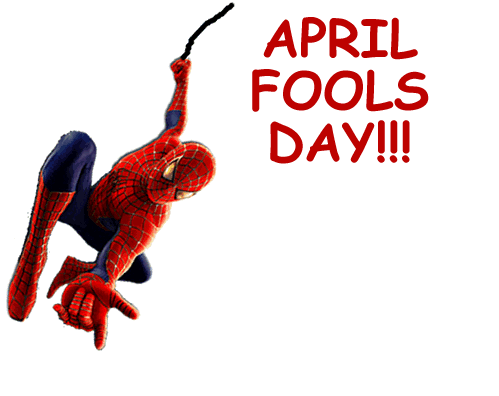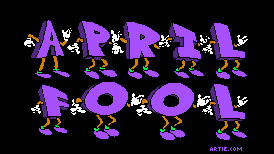April Fools' Day

April Fools' Day (sometimes called All Fools' Day) is an annual celebration in some European and Western countries commemorated on April 1 by playing practical jokes and spreading hoaxes.
The jokes and their victims are called April fools. People playing April Fool jokes often expose their prank by shouting "April fool"
at the unfortunate victim(s).

Poisson d'Avril🎣🐟🐠
Un poisson d’avril est une plaisanterie, que l’on fait le 1er avril à ses connaissances, à ses amis et sa famille. Il est aussi de coutume de faire des canulars dans les médias, aussi bien presse écrite, radio, télévision que sur Internet.
Pour les enfants, il consiste à accrocher un poisson de papier dans le dos des personnes dont on veut se moquer. « Poisson d’avril ! » est aussi l’exclamation que l’on pousse une fois qu’une des plaisanteries est découverte.
Pour les enfants, il consiste à accrocher un poisson de papier dans le dos des personnes dont on veut se moquer. « Poisson d’avril ! » est aussi l’exclamation que l’on pousse une fois qu’une des plaisanteries est découverte.
🐠
Some newspapers, magazines and other published media report fake stories, which are usually explained the next day or below the news section in smaller letters. Although popular since the 19th century, the day is not a public holiday in any country.
Aside from April Fools' Day, the custom of setting aside a day for the playing of harmless pranks upon one's neighbor has historically been relatively common in the world.
🐟
Origins
Geoffrey Chaucer's The Canterbury Tales (1392) may contain the first recorded association between April 1 and foolishness, although this claim is controversial. In Chaucer's Canterbury Tales, the "Nun's Priest's Tale" is set Syn March bigan thritty dayes and two. Readers apparently understood this line to mean "32 March", i.e. April 1. In Chaucer's tale, the vain cock Chauntecleer is tricked by a fox.
However, it is not clear that Chaucer was referencing April 1. Modern
scholars believe that there is a copying error in the extant manuscripts and that Chaucer actually wrote, Syn March was gon. If so, the passage would have originally meant 32 days after March, i.e. 2 May, the anniversary of the engagement of King Richard II of England to Anne of Bohemia, which took place in 1381.
🐠
In 1508, French poet Eloy d'Amerval referred to a poisson d’avril (April fool, literally "Fish of April"), a possible reference to the holiday. In 1539, Flemish poet Eduard de Dene wrote of a nobleman who sent his servants on foolish errands on April 1. In 1686, John Aubrey referred to the holiday as "Fooles holy day", the first British reference. On April 1, 1698, several people were tricked into going to the Tower of London to "see the Lions washed".
🐠
In the Middle Ages, New Year's Day was celebrated on March 25 in most European towns. In some areas of France, New Year's was a week-long holiday ending on April 1. Some writers suggest that April Fools' originated because those who
celebrated on January 1 made fun of those who celebrated on other dates. The use of January 1 as New Year's Day was common in France by the mid-16th century, and this date was adopted officially in 1564 by the Edict of Roussillon.
🐟
In the Netherlands, the origin of April Fools' Day is often attributed to the Dutch victory at Brielle in 1572, where the Spanish Duke Álvarez de Toledo was defeated. "Op 1 april verloor Alva zijn bril." is a Dutch proverb, which can be
translated to: "On the first of April, Alva lost his glasses." In this case, the glasses ("bril" in Dutch) serve as a metaphor for Brielle. This theory, however, provides no explanation for the international celebration of April Fools' Day.
🐠
Although no Biblical scholar or historian are known to have mentioned a relationship, some have expressed the belief that the origins of
April Fool's Day may go back to the Genesis flood narrative. In a 1908 edition of the Harper's Weekly cartoonist Bertha R. McDonald wrote: "authorities gravely back with it to the time of Noah and the ark. The London Public Advertiser
of March 13, 1769, printed: 'The mistake of Noah sending the dove out of the ark before the water had abated, on the first day of April, and to perpetuate the memory of this deliverance it was thought proper, whoever forgot so remarkable a circumstance, to punish them by sending them upon some sleeveless errand similar to that ineffectual message upon which the bird was sent by the patriarch'."
.JPG)
.JPG)
Longstanding Customs
April fish
In Italy, France, Belgium, The Netherlands, and French-speaking areas of Switzerland and Canada, April 1 tradition is often known as "April fish" (poissons d'avril in French, aprilvis in Dutch or pesce d'aprile in Italian). This includes attempting to attach a paper fish to the victim's back without being noticed. Such fish feature prominently on many late 19th- to early 20th-century French April Fools' Day postcards. Many newspapers also spread a false story on April Fools' Day, and a subtle reference to a fish is sometimes given as a clue.
🐟
United Kingdom
In the UK, an April Fool joke is revealed by shouting "April fool!" at the recipient, who becomes the "April fool". A study in the 1950s, by folklorists Iona and Peter Opie, found that in the UK, and in countries whose traditions derived from the UK, the joking ceased at midday. A person playing a joke after midday is the "April fool" themselves.
🐟
In England a "fool" is known by different names around the country, including a "noodle", "gob", "gobby" or "noddy".
🐟
In Scotland, April Fools' Day was traditionally called 'Huntigowk Day', although this name has fallen into disuse. The name is a corruption of 'Hunt the Gowk', "gowk" being Scots for a cuckoo or a foolish person; alternative terms in Gaelic would be Là na Gocaireachd 'gowking day' or Là Ruith na Cuthaige 'the day of running the cuckoo'. The traditional prank is to ask someone to deliver a sealed message that supposedly requests help of some sort. In fact, the message reads "Dinna laugh, dinna smile. Hunt the gowk another mile." The recipient, upon reading it, will explain he can only help if he first contacts another person, and sends the victim to this next person with an identical message, with the same result.
🐟
In Ireland, it was traditional to entrust the victim with an "important letter" to be given to a named person. That person would then ask the victim to take it to someone else, and so on. The letter when finally opened contained the words "send the fool further".
🐟
Poland
In Poland, prima aprilis ("1 April" in Latin) is a day in which many jokes are told; various hoaxes are prepared by people, media (which sometimes cooperate to make the "information" more credible) and even public institutions. Serious activities are usually avoided. This conviction is so strong that the anti-Turkish alliance with Leopold I signed on April 1, 1683, was backdated to March 31.
🐟
Nordic countries
Danes, Finns, Icelanders, Norwegians and Swedes celebrate April Fools' Day (aprilsnar in Danish; aprillipäivä in Finnish). Most news media outlets will publish exactly one false story on April 1; for newspapers this will typically be a first-page article but not the top headline.
🐟
India
In India, there have been numerous references to April Fools' Day in both cinema and popular literature and people are jovially associated with the day.
🐟
Lebanon
In Lebanon, an April Fool joke is revealed by shouting "كذبة ابريل !" (which means "Aprils fool!") at the recipient, who becomes the "April fool"

.gif)


.gif)

In Italy, France, Belgium, The Netherlands, and French-speaking areas of Switzerland and Canada, April 1 tradition is often known as "April fish" (poissons d'avril in French, aprilvis in Dutch or pesce d'aprile in Italian). This includes attempting to attach a paper fish to the victim's back without being noticed. Such fish feature prominently on many late 19th- to early 20th-century French April Fools' Day postcards. Many newspapers also spread a false story on April Fools' Day, and a subtle reference to a fish is sometimes given as a clue.
🐟
United Kingdom
In the UK, an April Fool joke is revealed by shouting "April fool!" at the recipient, who becomes the "April fool". A study in the 1950s, by folklorists Iona and Peter Opie, found that in the UK, and in countries whose traditions derived from the UK, the joking ceased at midday. A person playing a joke after midday is the "April fool" themselves.
🐟
In England a "fool" is known by different names around the country, including a "noodle", "gob", "gobby" or "noddy".
🐟
In Scotland, April Fools' Day was traditionally called 'Huntigowk Day', although this name has fallen into disuse. The name is a corruption of 'Hunt the Gowk', "gowk" being Scots for a cuckoo or a foolish person; alternative terms in Gaelic would be Là na Gocaireachd 'gowking day' or Là Ruith na Cuthaige 'the day of running the cuckoo'. The traditional prank is to ask someone to deliver a sealed message that supposedly requests help of some sort. In fact, the message reads "Dinna laugh, dinna smile. Hunt the gowk another mile." The recipient, upon reading it, will explain he can only help if he first contacts another person, and sends the victim to this next person with an identical message, with the same result.
🐟
In Ireland, it was traditional to entrust the victim with an "important letter" to be given to a named person. That person would then ask the victim to take it to someone else, and so on. The letter when finally opened contained the words "send the fool further".
🐟
Poland
In Poland, prima aprilis ("1 April" in Latin) is a day in which many jokes are told; various hoaxes are prepared by people, media (which sometimes cooperate to make the "information" more credible) and even public institutions. Serious activities are usually avoided. This conviction is so strong that the anti-Turkish alliance with Leopold I signed on April 1, 1683, was backdated to March 31.
🐟
Nordic countries
Danes, Finns, Icelanders, Norwegians and Swedes celebrate April Fools' Day (aprilsnar in Danish; aprillipäivä in Finnish). Most news media outlets will publish exactly one false story on April 1; for newspapers this will typically be a first-page article but not the top headline.
🐟
India
In India, there have been numerous references to April Fools' Day in both cinema and popular literature and people are jovially associated with the day.
🐟
Lebanon
In Lebanon, an April Fool joke is revealed by shouting "كذبة ابريل !" (which means "Aprils fool!") at the recipient, who becomes the "April fool"

.gif)


.gif)

No comments:
Post a Comment